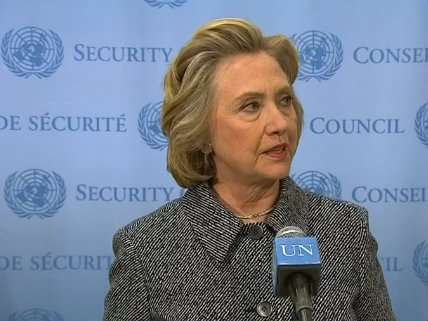Hillary Clinton and the Saga of Sidney Blumenthal
Former administration staffer and foundation employee sought to influence Clinton while she served as Secretary of State.

The latest story in the Clinton Foundation saga is a messy personnel drama involving Sidney Blumenthal, a longtime Clinton family loyalist and fixer who worked in Bill Clinton's administration.
As with previous stories, it's a bit labyrinthine, but it suggests the ways that old ties from the Clinton administration have in recent years been rolled over into the Clinton Foundation, and how interests related to those old ties influenced Hillary Clinton's work as Secretary of State.
The New York Times reported that Blumenthal, who had been barred by Obama administration aides from serving as a State Department employee during Hillary Clinton's time as Secretary of State, nonetheless managed to get more than two dozen memos on various foreign policy issues in front of Clinton during her time as America's top diplomat.
This was in direct contradiction to the usual procedures, which require a careful vetting of the information and analysis that makes its way to senior administration officials. Blumenthal's memos, the Times report suggests, were designed to feel like conventional State memos, but lacked proper sourcing or discussion of the motives of various players.
But Blumenthal probably would not have wanted to go too deep into detail about some of his sources or their motivations because, according to the Times, the information he provided, "appears to have come from a group of business associates he was advising as they sought to win contracts from the Libyan transitional government." The report strongly suggests that Blumenthal was the front man for an effort by Clinton's allies and their associates to profit off of conflict in Libya: "The venture," it says, "which was ultimately unsuccessful, involved other Clinton friends, a private military contractor and one former C.I.A. spy seeking to get in on the ground floor of the new Libyan economy."
It's more than a little suspicious: As The Washington Examiner's Timothy Carney put it on Twitter, "Hillary Clinton helped push us into an illegal war in Libya, and her advisor was making money off regime change." Well, it certainly sounds like Blumenthal tried.
Naturally, during this time, Blumenthal, who'd been blocked from employment at the Department of State, was employed by the Clinton Foundation. The New York Times says that his job there was "to help with research."
Blumenthal's memos may not have been up to snuff, but Hillary Clinton appears to have treated them seriously. According to the Times, she would distribute them to other officials and sometimes as for responses, and she continued to do so "even after other senior diplomats concluded that Mr. Blumenthal's assessments were often unreliable."
So here's what appears to have happened: Hillary Clinton was not allowed to hire her family's old adviser Blumenthal during her time at State. Instead, the Clinton Foundation kept him on the payroll as a researcher, where he appears to have fed Hillary Clinton bad information planted by his clients who had international interests. Clinton treated that information and analysis seriously, despite its low quality. Blumenthal was, in a sense, a shadow Clinton staffer, paid by the foundation and kept on despite being blocked from an official job. In some ways the story resembles the Hillary Clinton email story that broke a few months ago: She ran all of her email through a privately run server, in violation of official expectations.
Like the Uranium One kerfuffle, it's all in line with the sort of not-illegal-but-shady-seeming behavior, mixing professional ties and personal finances, that the Clintons have specialized in for a while. Recall that when the Clintons left the White House, they bought the Chappaqua, NY, house they now live in using a loan backed with $1.35 million from the Clinton administration fundraiser, and current Virginia governor, Terry McAuliffe. The deal was frowned upon when it happened: "It's just plain wrong. It's dangerous. It's inappropriate. This is a financial favor worth over a million dollars to the president," Fred Wertheimer of Democracy 21 told The Washington Post. But McAullife's cash saved either party from having to share personal financial details. ''There's the ability to remain discreet,'' Melissa Cohn, president of the Manhattan Mortgage Company, told The New York Times at the time, ''It saves them from any disclosure.''
That's the pattern here—a consistent disinterest in submitting to oversight or playing by the rules as others are expected to do. (The Clinton Foundation, too, has consistently failed to fully disclose its donors, even where agreements are in place for it to do so, and even when it has insisted that the disclosures were already made.)
Fittingly, for a candidate who seems so wary of transparency and disclosure, Clinton's team has declined to answer questions from the press on this or any other subject for nearly a month. The last time she took a question from a reporter was on April 21.


Show Comments (88)